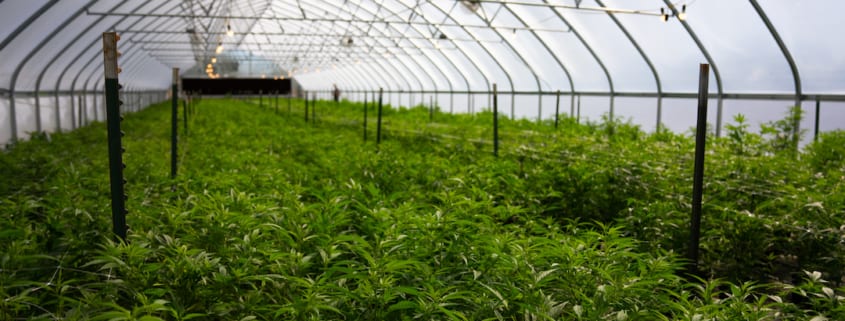The profitability of a crop is often made or lost on the margins, which is why choosing seeds with good genetic qualities is one of the fundamental keys to farming success. If you are planning to farm hemp, what hemp genetics should you be searching for in your seeds? Let’s take a look at the most important genetic qualities farmers should evaluate before investing in hemp seeds.
Crop Yield
One of the first decisions a farmer must make when farming hemp is what crop they want to harvest. Hemp is a versatile plant that can, depending on the strain, produce different crops, including grains, fibers, smokable flowers, and resin that is used to create CBD or CBG oil. CBD oil offers farmers the best return on investment and is, unsurprisingly, an extremely popular crop to harvest.
Once you’ve decided what hemp crop you want to harvest, look for hemp seeds that have been bred to increase your chosen crop yield. For example, many seed companies (including High Grade Hemp Seed) have performed years of hemp breeding to develop seeds that produce high levels of CBD oil or CBG oil. Choosing seeds that can increase your yield by even just five percent could boost your profits by hundreds, maybe even thousands of dollars per acre.
Hemp Genetics Spotlight – Matterhorn CBG
The Matterhorn CBG hemp strain is a great example of seed genetics designed to increase crop yields. Using hemp breeding, Matterhorn CBG was developed specifically to produce CBG oil (one of the first seeds ever bred for CBG production). Typical hemp plants produce notoriously low amounts of CBG oil, but Matterhorn CBG can produce up to 15% CBG extract.
Feminization
CBD and CBG oil are harvested from the flowers of female hemp plants. Male plants produce only trace amounts of the valuable resin (which produces the oil when extracted), and are not worth harvesting. Worse, male plants pollinate female plants, drastically lowering their yield of CBD and CBG oil. That means even a few male plants in a field can pollinate many females, dramatically lowering a farmer’s profit. (Take a look at our article all about the value of feminized hemp seeds.)
While male hemp plants are useful for hemp breeding, they are dangerous intruders in a field being grown for crops. That is why it can be invaluable for farmers to invest in feminized hemp seeds. Feminized hemp seeds grow exclusively into female plants, giving farmers the peace of mind that their plants will generate income instead of stealing it away. (Note: Even the best seed companies can’t guarantee a 100% feminization of their seeds, but they can come close. Look for seeds with at least a 99% feminization rate.)
Robustness
Every planting season contains hidden risks. Farmers can’t control the rain or heat or prevent severe weather events. To help manage those risks, one thing farmers can do is invest in seed genetics that promote overall robustness in their hemp plants.
Hemp seeds bred for robustness can better withstand rough weather, including cold, heat, drought, and rain. This means farmers are more likely to see a profit each year rather than have to deal with the rollercoaster of boom and bust crop cycles depending on what Mother Nature decides.
Hemp Genetics Spotlight – Berry Blossom
Berry Blossom is an industry-standard hemp strain lauded for its ability to handle even the roughest conditions. Its robustness makes it one of the most popular hemp strains on the market.
Finishing Time
Hemp plants grown for CBD and CBG oil typically require 108 to 120 of growth after germination until they can be harvested. One challenge farmers face in planting many fields with the same strain of hemp seed is that all the fields need the same attention at the same time. The planting of all the seeds must be done within a small window of time. The same is true when it comes time to harvest the crop.
Harvesting can be especially tricky, because if farmers wait too long, a crop’s THC levels could rise above the legal limit, making the crop worthless. New hemp strains have been bred to grow and mature more quickly. This much-appreciated trait allows farmers to stagger their harvest, giving them the ability to use labor much more efficiently.
Additionally, seeds with fast finishing times are an ideal choice for farmers who live in areas with shorter growing seasons, like Colorado, where early fall or late summer frosts can put an entire crop at risk.
Hemp Genetics Spotlight – Autoflower
The Autoflower hemp strain is a great example of seed genetics designed for rapid growth. Autoflowers can reach harvesting maturity in just 70 to 75 days after emergence. That’s weeks faster than typical hemp strains, which can give farmers more flexibility in their planting and harvesting schedules.
Terpene Profile
Terpenes are the aromatic compounds found in a female hemp plant’s flower along with CBD and CBG oil. Every hemp strain possesses its own “terpene profile.” Terpene profiles vary dramatically. Some hemp plants are notable for their floral bouquets while others are famous for loud notes of cheese or even skunk.
A hemp plant’s terpene profile is determined by its seed genetics, and farmers should consider this quality when they evaluate different hemp strains. Your crop’s terpene profile will affect your clientele options and downstream market opportunities. For example, some clients love skunky hemp buds, while others prefer fruity or floral scents.
Hemp Genetics Spotlight – Red Bordeaux
The Red Bordeaux hemp strain is popular, in part, for its pleasant terpene profile of fresh cut strawberries and crushed lavender. Smokers of the plant’s bud can even discover hints of cherry and gasoline in this unique strain.
Legal Compliance
A unique challenge of industrial hemp farming is that farmers must ensure that their hemp crop possesses less than 0.3% of THC. Plants that exceed this limit cannot be legally harvested and sold as industrial hemp.
Keeping plants below this threshold starts with choosing the right seeds. Many farmers believe that external factors like soil chemistry, extreme weather, or other stressors can cause hemp plants to “go hot” and produce too much THC.
However, new research from Cornell University suggests that THC levels are determined in large part by a seed’s genes. That makes it more important than ever to choose hemp seeds from strains with proven low levels of THC. Of course, even with the best seed genetics, you’ll still need to continuously monitor the THC level of your crop and make sure you harvest your plants before their THC levels rise above the legal limit.
Consider Genes, Not Hype
Seed genetics really can make or break your hemp farm, which is why it’s so important that you do your homework before you purchase your seeds. Research the genetic profiles of your seeds and invest in the best hemp genetics you can find.
When comparing different hemp seeds, look at:
- Average CBD or CBG oil yield
- Feminization rates
- Robustness
- Finishing speed
- Terpene profile
- THC levels
The top hemp seed companies have spent years working with highly-trained scientists and farmers to conduct their hemp breeding programs in order to develop hemp seed strains with attributes farmers want. Representatives from these companies should be happy to discuss their hemp strains and point you to the hemp strains with the genetics best suited for the conditions on your farm.
It’s always a good idea to work directly with companies that develop their own seeds rather than seed resellers. With resellers, you never really know what you’re going to get. At High Grade Hemp Seed, we’ve been passionately developing new and unique hemp seed strains since 2011. Our seeds are renowned for their robustness and their unique terpene profiles. We offer a variety of early finisher hemp strains and provide a feminization rate of over 99.8%.
Contact us today. We can’t wait to talk about hemp genetics with you!



 High Grade Hemp Seed
High Grade Hemp Seed